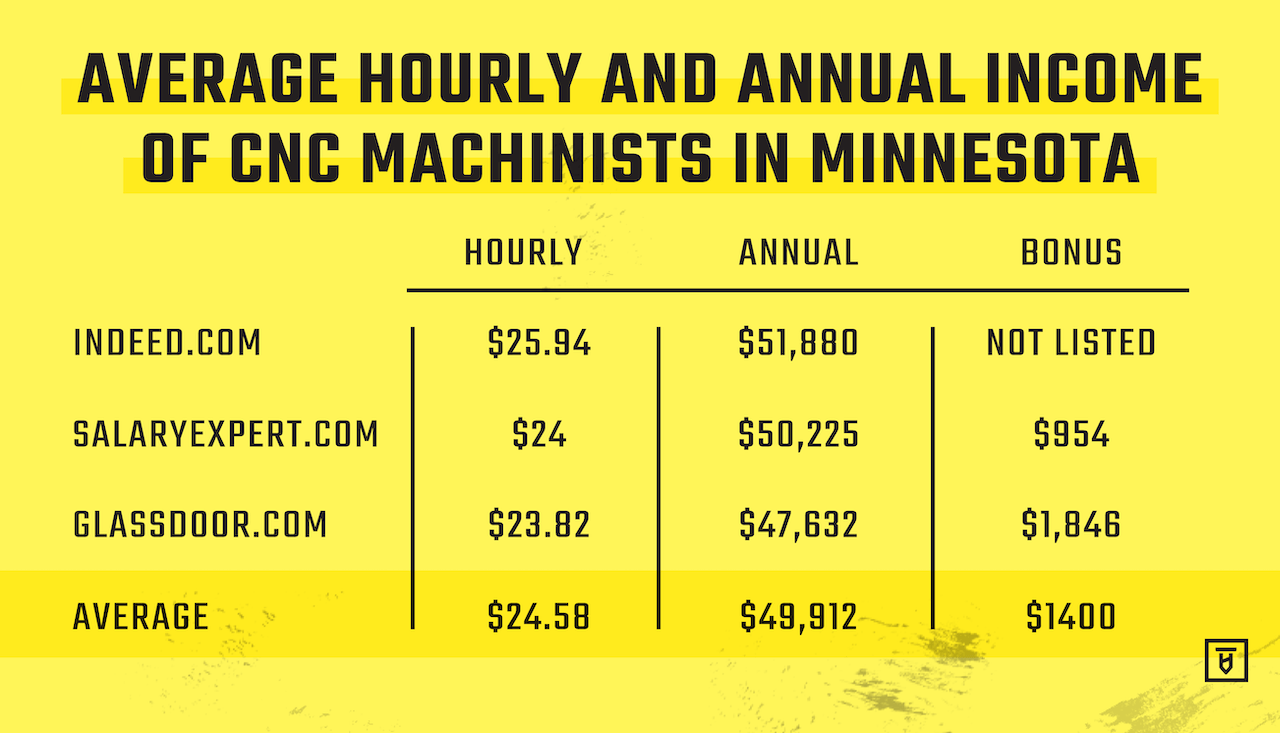Table of Contents
CNC operators are in high demand in today’s manufacturing industry, thanks to their specialized skills in operating and programming computer numerical control machines. But have you ever wondered how much these skilled professionals actually make on an hourly basis? The answer may surprise you.
According to recent data from the Bureau of Labor Statistics, the median hourly wage for CNC operators in the United States is $19.76. However, wages can vary greatly depending on a variety of factors, including location, industry, and level of experience. So, if you’re considering a career as a CNC operator, it’s important to do your research and understand what factors may impact your earning potential.
CNC operators make an average hourly wage of $19.19. However, the wage can vary depending on experience and location. Entry-level CNC operators can expect to make around $14 per hour, while experienced operators can make up to $30 per hour. Additionally, certain industries such as aerospace and defense tend to pay higher wages for CNC operators.
How Much Do CNC Operators Make an Hour?
CNC (Computer Numerical Control) machines are used to manufacture a wide range of products, from car parts to medical implants. The CNC operator is responsible for setting up, programming, and monitoring the machine to ensure that it produces high-quality parts. But how much does a CNC operator make an hour?
Industry Averages
The average hourly wage for a CNC operator in the United States is $19.99, according to data from the Bureau of Labor Statistics. However, this can vary depending on a number of factors, including experience, location, and the type of industry in which the operator works.
In general, CNC operators who work in the aerospace, defense, and medical industries tend to earn higher wages than those who work in other industries. This is because the parts produced in these industries require a high degree of precision and accuracy.
Benefits of Being a CNC Operator
One of the benefits of being a CNC operator is job security. As long as there is a need for manufactured products, there will be a need for skilled CNC operators. Additionally, many companies offer benefits such as health insurance, retirement plans, and paid time off to their employees.
Another benefit of being a CNC operator is the potential for career advancement. With experience and additional training, operators can move up into management or engineering positions.
Factors That Affect CNC Operator Wages
There are several factors that can affect how much a CNC operator makes an hour. One of the most important is experience. Operators with more experience are generally able to command higher wages than those who are just starting out.
Location is another factor that can affect wages. In areas with a high cost of living, operators may earn higher wages to compensate for the higher expenses.
Finally, the type of industry in which the operator works can also affect wages. As mentioned earlier, operators who work in the aerospace, defense, and medical industries tend to earn higher wages than those who work in other industries.
CNC Operator vs. Other Manufacturing Jobs
Compared to other manufacturing jobs, CNC operators tend to earn higher wages. For example, the average hourly wage for a machinist is $20.98, while the average hourly wage for a production worker is $15.03, according to data from the Bureau of Labor Statistics.
One reason for this is the specialized skills required to operate a CNC machine. In addition to setting up and programming the machine, operators must also be able to troubleshoot any issues that arise during the manufacturing process.
Training and Education
Becoming a CNC operator typically requires at least a high school diploma or equivalent. However, many employers prefer candidates who have completed a vocational or technical program in machining or CNC technology.
In addition to formal education, on-the-job training is also important for becoming a skilled CNC operator. This may include working alongside experienced operators and attending training sessions offered by the employer.
Career Outlook
The job outlook for CNC operators is positive, with a projected growth rate of 3% from 2019 to 2029, according to the Bureau of Labor Statistics. This is in line with the average growth rate for all occupations.
As manufacturing processes become increasingly automated, the need for skilled CNC operators is likely to remain strong. Additionally, as older operators retire, there will be opportunities for new workers to enter the field.
Conclusion
In summary, CNC operators make an average hourly wage of $19.99 in the United States. However, wages can vary depending on experience, location, and the type of industry in which the operator works. Compared to other manufacturing jobs, CNC operators tend to earn higher wages due to the specialized skills required for the job. Becoming a skilled CNC operator requires a combination of formal education and on-the-job training, and the job outlook for the field is positive.
Frequently Asked Questions
Here are some common questions related to the hourly rate of CNC operators:
What is a CNC operator?
A CNC (Computer Numerical Control) operator is responsible for operating and maintaining CNC machines used in manufacturing. These machines are used to cut and shape materials such as metal, plastic, and wood into precise shapes and sizes. CNC operators are skilled professionals who can read technical drawings, program machines, and ensure that the final product meets quality standards.
The hourly rate of a CNC operator varies depending on factors such as experience, location, and industry. However, according to the Bureau of Labor Statistics, the median hourly wage for CNC operators in the United States was $19.51 as of May 2020.
What factors affect the hourly rate of CNC operators?
Several factors can affect the hourly rate of CNC operators, including:
- Experience: More experienced CNC operators tend to earn higher hourly rates.
- Location: Hourly rates can vary depending on the state or region where the CNC operator works.
- Industry: CNC operators in certain industries, such as aerospace or medical device manufacturing, may earn higher hourly rates due to the specialized nature of the work.
- The type of CNC machine: Operators who work with more complex or advanced CNC machines may earn higher hourly rates than those who work with simpler machines.
Overall, CNC operators who have specialized skills or work in high-demand industries may have higher hourly rates than those who work in more general manufacturing roles.
What is the average hourly rate for entry-level CNC operators?
The hourly rate for entry-level CNC operators can vary depending on their location and industry. However, according to data from Payscale, the average hourly rate for entry-level CNC operators in the United States is $14.80. This rate may increase as the operator gains more experience and skills.
Entry-level CNC operators are typically responsible for basic tasks such as loading and unloading materials, performing quality checks, and running simple programs. As they gain more experience and training, they may take on more complex tasks and earn higher hourly rates.
What is the hourly rate for experienced CNC operators?
The hourly rate for experienced CNC operators can vary depending on their location and industry. According to data from Payscale, the average hourly rate for CNC operators with 5-9 years of experience in the United States is $19.09, while operators with 10-19 years of experience earn an average of $21.83 per hour.
Experienced CNC operators may be responsible for tasks such as programming machines, troubleshooting issues, and training new operators. They may also work with more advanced CNC machines or in specialized industries, which can lead to higher hourly rates.
What are some tips for increasing hourly pay as a CNC operator?
If you are a CNC operator looking to increase your hourly pay, here are some tips:
- Seek out additional training or certifications in areas such as programming or machine maintenance.
- Look for job opportunities in high-demand industries or regions.
- Consider taking on more advanced or specialized tasks within your current role.
- Ask for feedback from your supervisor and work to improve your skills and performance.
- Stay up-to-date with the latest advancements in CNC technology and techniques.
By taking these steps, you can improve your value as a CNC operator and potentially earn a higher hourly rate.
In conclusion, the salary of CNC operators varies depending on various factors such as experience, location, and the industry they work in. However, on average, they can make between $15 to $30 per hour. With the increasing demand for CNC operators and the growth of the manufacturing industry, there is a high potential for career growth and higher salaries in the future.
It is important to note that CNC operators require specialized skills and knowledge, making them valuable assets to companies. As such, they can negotiate for better pay and benefits packages. Additionally, gaining more experience and certifications can help increase their earning potential and open up more job opportunities.
In summary, CNC operators can earn a decent hourly wage and have potential for career growth. As the manufacturing industry continues to develop and evolve, the demand for skilled CNC operators will only increase, making it a lucrative and rewarding career choice.
Request a quote today!
[contact-form-7 id="1578" title="Contact form"]
Please compress the file into a ZIP or RAR file before uploading. Alternatively, send through your RFQ by email.
enquires@unitymanufacture.com





